|
|
|
Sort Order |
|
|
|
Items / Page
|
|
|
|
|
|
|
| Srl | Item |
| 1 |
ID:
190422
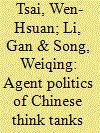

|
|
|
|
|
| Summary/Abstract |
This paper analyzes the relationship between the Chinese government and domestic think tanks. Chinese think tanks in the cultural sector have a strong demand-side orientation; that is, they closely follow the instructions of the Chinese Communist Party (CCP) in their stand on culture-related policies. Since 2018, the CCP has strengthened its control over the propaganda and cultural affairs, using think tanks to this end. Think tanks act as dual agents, maximizing the benefits offered by their two principals – the party government and private businesses, while prioritizing the former. The paper examines the development of the Putuo Island Park in Zhejiang Province and the Cultural Industry Research Institute, the key cultural industry think tank in this province. While upholding Xi Jinping’s aspiration of developing China into a “cultural great power,” cultural think tanks’ main function is to endorse government policies and guide businesses to support those policies when necessary. The CCP under Xi has intensified its manipulation of think tanks to reinforce its control over ideology and the socialist market economy, resulting in a more complex relationship between the state and think tanks.
|
|
|
|
|
|
|
|
|
|
|
|
|
|
|
|
| 2 |
ID:
192131
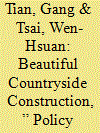

|
|
|
|
|
| Summary/Abstract |
This article seeks to demonstrate that there is a certain degree of political participation in contemporary China. We argue that the qunzhong, or ‘masses’, in China can be divided into three categories: members of autonomous grassroots organizations, local elites (xin xiangxian), and victims of rights violations, and we illustrate our discussion of the impact of these three groups on policy through the example of the ‘Beautiful Countryside Construction’ policy. Our analysis focuses on how the masses express their opinions to inspection teams dispatched by county governments. Finally, we argue that China’s grassroots qunzhong do have a role in providing feedback on policy, but whether their suggestions are heeded by the higher-level authorities still depends on wider political considerations.
|
|
|
|
|
|
|
|
|
|
|
|
|
|
|
|
| 3 |
ID:
119712
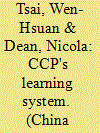

|
|
|
| 4 |
ID:
183641
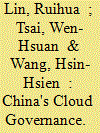

|
|
|
|
|
| Summary/Abstract |
The Chinese Communist Party (CCP) regime has enhanced the sharing of information between government departments through "cloud governance" using big data. Local governments have set up big data bureaus, which have created government data-sharing platforms to solve the problem of "data islands" with limited external connectivity. We use the case of COVID-19 containment and crisis management to examine how local governments in China use cloud governance to deal with special tasks, such as the maintenance of social stability, disease prevention and control, and economic recovery. We argue that the CCP's emphasis on cloud governance is part of its effort to learn new technologies in order to consolidate its rule.
|
|
|
|
|
|
|
|
|
|
|
|
|
|
|
|
| 5 |
ID:
163449
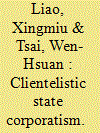

|
|
|
|
|
| Summary/Abstract |
United front work has played an important role in the history of the
Chinese Communist Party (CCP). Since 2012, Xi Jinping has strengthened the united front system’s e�cacy and further proposed formation
of a “great united front.” He holds that united front work’s essence is
“making friends,” in which regard the CCP under Xi has introduced a
new practice called “pairing-up.” It stipulates that local governments at
all levels must facilitate establishment of “friendly” relations between
members of Party committees and specific persons in charge of
so-called democratic parties to further implementation of united front
work. This new form of united front embodies “clientelistic state
corporatism.” We use the case of L City to analyze the united front
model of pairing-up, its e�ects and limitations, and the CCP’s social
control strategy
|
|
|
|
|
|
|
|
|
|
|
|
|
|
|
|
| 6 |
ID:
153388
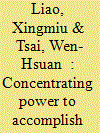

|
|
|
|
|
| Summary/Abstract |
This article discusses the operations of the Chinese Communist Party (CCP) pishi system from the perspective of decision making. As an authoritarian regime, the CCP ‘concentrates power to accomplish big things’, demonstrating the extent of the CCP’s state capacity. This article argues that, through a wide range of documentation, the CCP provides leaders with a channel for resource accumulation, to issue pishi (written directives). Next, mishu (secretaries) play an extremely important role in the transmission of documents and the execution of pishi. This article then goes on to point out that the CCP’s practice of nomenklatura is a key means to ensure that pishi are executed as expected. Finally, this article discusses the advantages and disadvantages of the pishi system.
|
|
|
|
|
|
|
|
|
|
|
|
|
|
|
|
| 7 |
ID:
183633
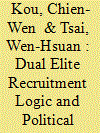

|
|
|
|
|
| Summary/Abstract |
Under Xi Jinping, the cadre recruitment policy of the Chinese Communist Party (CCP) has been adapted. What are the political implications of these adaptations? This paper argues that Xi has sought to consolidate his power among the political elite and strengthen grassroots governance by introducing a new cadre recruitment policy. We propose the concept of “dual elite recruitment logic” as an aid to interpreting the cadre recruitment strategy in the Xi era: the CCP’s system for appointing and promoting cadres at the full provincial/ministerial level (正部级 zhengbuji) and the grassroots follows’ criteria that are different from those formulated under the previous “rejuvenation of cadres” principle. While China under Xi may be able to maintain political stability and promote socio-economic development in the short term, the lack of a new succession mechanism is the biggest obstacle to China’s future political development.
|
|
|
|
|
|
|
|
|
|
|
|
|
|
|
|
| 8 |
ID:
132947
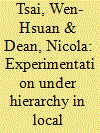

|
|
|
|
|
| Publication |
2014.
|
| Summary/Abstract |
Reforms carried out by the Chinese Communist Party (CCP) have long followed a traditional model of "experimentation under hierarchy." This article will attempt to develop this model further by building a framework to illustrate the influence of both the political dynamics of hierarchical central-local relations and local economic circumstances in the introduction of large-scale political reforms. The initiation and expansion of "experimental points" are only permitted in those select few provinces with both favourable political and economic local conditions, allowing the CCP to minimize risk and make informed decisions regarding possibilities for nationwide reform. This article proposes that the hierarchical interaction of central and local political elites, and in particular provincial secretaries, can explain the extent of reforms, whereas the type of reform is linked to distinct provincial economic conditions and the provincial secretary's interpretation of provincial priorities. Put succinctly, the CCP's model of political reform can be specifically characterized as "experimentation under hierarchy in local conditions." This article presents a detailed discussion of both the political and economic considerations inherent in this concept, and provides examples of reform programmes in Guangdong and Sichuan to illustrate the model in practice.
|
|
|
|
|
|
|
|
|
|
|
|
|
|
|
|
| 9 |
ID:
184754
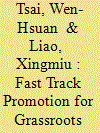

|
|
|
|
|
| Summary/Abstract |
Although the “selected graduate” (xuandiaosheng) system is not new, Xi Jinping has changed it substantially since he came to power. This paper introduces the concept of the “promotion ladder” to describe how low-ranking cadres must wait longer for promotion than do mid- and high-ranking cadres. This promotion ladder often leads to low-ranking cadres hitting a ceiling in their careers. For this reason, section-level cadres need a fast track that will allow them to “sprint with small steps” (xiaobu kuaipao) if they are to make significant progress in their careers. The xuandiaosheng system not only works as an important means for accelerating the promotion of grassroots cadres but also allows cadre management to start as soon as a prospective cadre graduates from a university. The system introduces flexibility into the Chinese Communist Party’s (CCP’s) cadre system, allowing it to cope with the constraints of the promotion ladder. This paper will summarize the operation of the xuandiaosheng system under Xi Jinping and discuss its advantages and disadvantages as well as its likely influence on CCP elite politics in the future.
|
|
|
|
|
|
|
|
|
|
|
|
|
|
|
|
| 10 |
ID:
151715
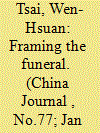

|
|
|
|
|
| Summary/Abstract |
Influenced by Confucian culture and Soviet traditions, the Chinese Communist Party (CCP) gives special attention to the arrangements for officials’ funerals. The format of these funerals is framed according to the officials’ rank and political performance. This article primarily discusses the funerals of national leaders and identifies five different roles: great leader, eminent leader, deposed leader, political offender, and political traitor. The leaders are given more stately funerals in accordance with how closely their performance in life is in accordance with the expectations of the Party. Through framing funerals, the leaders of the CCP seek to reinforce their personal political beliefs, as well as the ruling hegemony and legitimacy of the regime.
|
|
|
|
|
|
|
|
|
|
|
|
|
|
|
|
| 11 |
ID:
179164
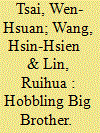

|
|
|
|
|
| Summary/Abstract |
This article argues that policy implementation in China has moved toward a system under which the center formulates a blueprint or “top-level design” from which local officials devise detailed regulations through a process of “crossing the river by feeling for stones.” This applies to the development of China’s new social credit system. To minimize political risk, when implementing it local officials have selected easier goals from the “top-level design” blueprint. In City Z, for example, we find that promoting integrity among businesses is less risky than promoting integrity among civil servants or the general public, so less progress has been made in the latter two areas when putting in place integrity credit-point systems. The risks involved in promoting social credit among the general populace are the greatest, so the city’s efforts in this have been limited. From our empirical study of China’s social credit system in City Z, we draw some conclusions about policy implementation under Xi Jinping.
|
|
|
|
|
|
|
|
|
|
|
|
|
|
|
|
| 12 |
ID:
147606
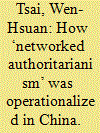

|
|
|
|
|
| Summary/Abstract |
Does network technology weaken the ability of authoritarian regimes to govern their citizens? Arguments and discussion regarding this proposition can be found in existing studies. Scholars who support this point of view believe that certain developments in network technology led to the outbreak of the Jasmine Revolution in Arab countries in 2011. This chain of rebellions provides an obvious and affirmative example of this theory. However, as far as Chinese research is concerned, an ever-increasing number of scholars are of the opinion that the Chinese Communist Party (CCP) has gradually mastered control of network technology. They believe the CCP actually employs the technology to strengthen its ability to govern Chinese society. This article discusses the CCP’s techniques of public opinion control in the context of new technology networks, and points out that the CCP has manifested the essence of a networked authoritarian regime, thus achieving the purpose of authoritarian consolidation.
|
|
|
|
|
|
|
|
|
|
|
|
|
|
|
|
| 13 |
ID:
177960
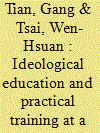

|
|
|
|
|
| Summary/Abstract |
Under Xi Jinping, the Chinese Communist Party is concentrating efforts on the cultivation of outstanding local cadres in order to improve local governance. For this purpose, it is strengthening the functions of local Party schools that offer students both political and administrative education to create a cohort of cadres who are both “red and expert.” We discuss how this is done in terms of curriculum planning, types of classes, and the student pool, using the example of County Z Party School. We find that since the national Eighteenth Party Congress, the Central Committee has reinforced its control over local Party schools to ensure that their curriculum and the methods they use to train cadres are consistent with national Party directives, as part of Beijing’s efforts to strengthen the Party’s grassroots governance.
|
|
|
|
|
|
|
|
|
|
|
|
|
|
|
|
| 14 |
ID:
169115
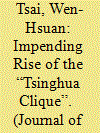

|
|
|
|
|
| Summary/Abstract |
The Tsinghua clique is highly influential in the Chinese Communist Party (CCP) politics. But in the past, alumni from other elite universities, such as Peking University and Renmin University of China, also occupied positions as senior cadres, so Tsinghua did not have any more influence than they did. However, since 2002, Tsinghua University has developed a ‘cultivation/transfer’ system whereby the school, in a purposeful, calculating, and organized manner, selects and trains talented students and then places them in political posts after graduation. After these students enter officialdom, they strengthen their ties with other alumni through their connections with the Tsinghua authorities and the Tsinghua Alumni Association. With this system in place, Tsinghua alumni account for the majority of ‘post-1980 generation’ county-level leading cadres. The authors therefore predict that the ‘Tsinghua clique’ will gain even stronger political influence, and Tsinghua University will likely become the most significant university for cultivating senior cadres.
|
|
|
|
|
|
|
|
|
|
|
|
|
|
|
|
| 15 |
ID:
196303


|
|
|
|
|
| Summary/Abstract |
The Chinese Communist Party’s (CCP’s) 2018 reform of party and government agencies introduced two models: merger and co-location. The merger model sees a party organization absorbing government departments with similar functions, creating a new party entity. In contrast, the co-location model places party and government units with related functions under one roof, without consolidating their operations. We argue that this political reform was designed to enhance institutional centralization in China. By implementing different models of party and government reform in various sectors, the CCP has demonstrated a flexible approach, shifting away from its earlier tendency towards either full integration or complete separation of party and government structures.
|
|
|
|
|
|
|
|
|
|
|
|
|
|
|
|
| 16 |
ID:
181930
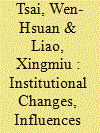

|
|
|
|
|
| Summary/Abstract |
The Chinese Communist Party (CCP) regards the Communist Youth League (CYL) as a critical and distinctive mass organization that acts as an “assistant” and “reserve army” for the Party. This article uses the analytical concepts of historical institutionalism and critical junctures to discuss the changes in the CYL during the post-Mao period. We focus on two critical junctures: 1982, when the CYL became a route to rapid promotion for cadres, and 2016, after which its cadres had fewer opportunities for promotion and the CYL was pushed back to its original role in youth United Front work. We also find that the CYL has refined its United Front methods to attract talented young people by offering them services. This reflects the efforts of the CCP regime to adapt to circumstances and ensure its survival.
|
|
|
|
|
|
|
|
|
|
|
|
|
|
|
|
| 17 |
ID:
144378
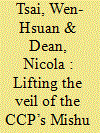

|
|
|
|
|
| Summary/Abstract |
This article analyzes the Chinese Communist Party’s opaque mishu (secretary) system. It consists of two branches: institutional mishu and personal mishu. The former are mainly employed in Party Committee general offices, to assist the Committee leadership and liaise between departments to push Committee policies and to administer and compile relevant documents to support the policy-making process. Personal mishu work instead in the individual leaders’ executive offices. Those working for members of the Politburo Standing Committee can be divided into four main categories: political, confidential, security and life mishu. Both institutional and personal mishu work essentially on behalf of CCP leaders at various levels. In addition to clarifying the formal arrangements of the mishu system, this article will also consider the system through the lens of unrestricted informal politics, discussing particularly how mishu are able to accumulate power through leverage of the client–patron relationship between themselves and their leading cadre.
|
|
|
|
|
|
|
|
|
|
|
|
|
|
|
|
| 18 |
ID:
165223
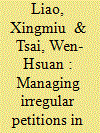

|
|
|
|
|
| Summary/Abstract |
This paper uses Province A and City T as case studies to explore the strategies used by the Chinese Communist Party (CCP) for managing citizens’ “irregular letters and visits” (irregular petitions) and the logic behind them. We believe that the local officials use both “hard” and “soft” measures to exercise control over these activities. The soft measures include persuasion and negotiation aimed at getting petitioners to abandon their irregular petitions. The hard measures involve the use of the coercive power of the state to compel the petitioners to return home. During important political meetings and holiday periods, both of which are popular times for petitioning, the CCP is more likely to take a hard approach to resolve serious problems and maintain stability. In normal times, it generally uses less costly soft tricks. These two social control strategies are utilized alternately by the CCP to maintain social stability and guarantee its regime survival.
|
|
|
|
|
|
|
|
|
|
|
|
|
|
|
|
| 19 |
ID:
161520
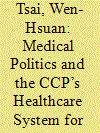

|
|
|
|
|
| Summary/Abstract |
The health of Chinese Communist Party (CCP) leaders is a sensitive and closely guarded secret, and academic literature on the topic has been sorely lacking as a consequence. Using the most up-to-date information, the author of this article will lift the cloak of mystery surrounding official CCP healthcare, detailing the operation of a confidential healthcare system established to provide state leaders with comprehensive medical treatment. The main hub of this system is the Central Commission for Healthcare (CCH), which falls under the jurisdiction of the General Office of the CCP Central Committee and coordinates with hospitals directly controlled by the Ministry of Health and the People’s Liberation Army. Aithor overall analytical framework uses the concept of medical politics, and we hold that the CCP uses the manipulation of its healthcare system to manage and control state leaders, thereby displaying the power of the state.
|
|
|
|
|
|
|
|
|
|
|
|
|
|
|
|
| 20 |
ID:
173793
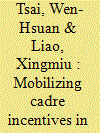

|
|
|
|
|
| Summary/Abstract |
This article discusses the ways in which the Chinese Communist Party (CCP) mobilizes local governments to implement policies set by higher-level governments. Using the concept of ‘institutionalized mobilization’, we discuss poverty alleviation in H county. We identify three key mechanisms: the cross-system leading group, cross-level personnel/financial management, and pairing-up. These mechanisms involve both the adjustment of tiao tiao (条条) and kuai kuai (块块) relationships within the bureaucracy and the strengthening of state–society relations. We also point out the many problems resulting from this mode of institutionalized mobilization. Finally, we compare the political and geographical conditions in H county with those in two other counties – E and K – to ascertain whether the results of poverty alleviation are sustainable.
|
|
|
|
|
|
|
|
|
|
|
|
|
|
|
|
|
|
|
|
|